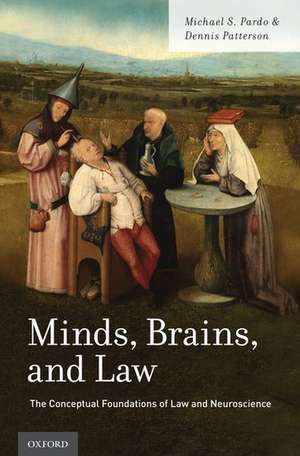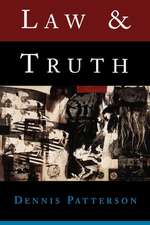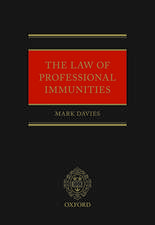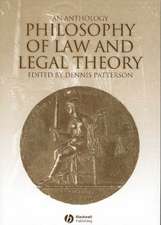Minds, Brains, and Law: The Conceptual Foundations of Law and Neuroscience
Autor Michael S. Pardo, Dennis Pattersonen Limba Engleză Paperback – 6 aug 2015
| Toate formatele și edițiile | Preț | Express |
|---|---|---|
| Paperback (1) | 249.75 lei 31-37 zile | |
| Oxford University Press – 6 aug 2015 | 249.75 lei 31-37 zile | |
| Hardback (1) | 672.71 lei 31-37 zile | |
| Oxford University Press – 5 dec 2013 | 672.71 lei 31-37 zile |
Preț: 249.75 lei
Preț vechi: 289.28 lei
-14% Nou
Puncte Express: 375
Preț estimativ în valută:
47.80€ • 49.72$ • 39.46£
47.80€ • 49.72$ • 39.46£
Carte tipărită la comandă
Livrare economică 04-10 aprilie
Preluare comenzi: 021 569.72.76
Specificații
ISBN-13: 9780190253103
ISBN-10: 019025310X
Pagini: 276
Dimensiuni: 155 x 231 x 18 mm
Greutate: 0.41 kg
Editura: Oxford University Press
Colecția OUP USA
Locul publicării:New York, United States
ISBN-10: 019025310X
Pagini: 276
Dimensiuni: 155 x 231 x 18 mm
Greutate: 0.41 kg
Editura: Oxford University Press
Colecția OUP USA
Locul publicării:New York, United States
Recenzii
The subject of neuro-legal studies has developed rapidly in the wake of advances in cognitive neuroscience . Its relevance to and bearing upon the law and legal proceedings, and upon the admissibility of neurological evidence in criminal law are of the greatest importance. Professors Pardo and Patterson have written a most timely book that subjects neuro-legal studies to meticulous conceptual scrutiny. They bring to bear impressive knowledge of neuroscience and law, as well as first-rate philosophical acumen. They write lucidly and present their opponents' case fairly. Their critical arguments are powerful and convincing, and will profoundly affect the current perception of the relation between law and neuroscience. This book should be studied by all lawyers and judges concerned with the relevance of cognitive neuroscience to the law, and by all students of law."
Not only is this book a masterful blending of highly knowledgeable law, neuroscience, and philosophy, but it also avoids both the excess claims and the excess skepticism that plague the literature on this increasingly important topic. The book will serve both as a valuable introduction to those who are new to neuroscience and law, and also as a set of distinctive positions that will engage those who are already involved with the subject."
Pardo and Patterson have powerfully and sophisticatedly constructed the skeptical argument concerning the relevance of neuroscience to law. Minds, Brains and Law will justifiably provoke controversy and debate and it should be required reading for anyone interested in this field."
Two conceptual difficulties bedevil neuroscience at present. One of these involves attributing psychological capacities to parts of the brain and not to the human being whose brain it is. The other involves on the one hand the claim that there are discrete regions of the association cortex that support particular psychological capacities; and on the other hand the claim that such capacities are discrete. These assumptions have profound implications for the interpretation of non-invasive brain images. This wonderful book sets out such caveats concerning the admissibility of neuroscience in courts of law."
The book's breadth, clarity, and generally on-point criticisms make it useful to a wide audience, worth reading for anyone working on what has come to be called 'neurolaw,' 'neuroethics,' or 'experimental philosophy,' but also of interest to moral and legal philosophers interested in developments in neuroscience (as arguably all moral and legal philosophers should be), and both academic and non-academic lawyers whose work engages neuroscientific evidence. There are also general lessons to be learned about how empirical evidence bears on philosophical claims, and Pardo and Patterson are generally good teachers." -Alexander Guerrero, University of Pennsylvania, Notre Dame Philosophical Reviews
[The British Society for Literature and Science] members researching numerous fields including the social and legal history of crime, psychology, philosophy, the emotions, literature and film will find food for thought in this impressive volume. Perhaps most importantly, Minds, Brains, and Law entreats us, as participants in interdisciplinary and international discourses, to think more carefully about the language we use, and its different contexts and connotations. By doing so, we may forge more effective collaborations in the future, from co-authored publications and interdisciplinary conferences to the trial of terror suspects.
Not only is this book a masterful blending of highly knowledgeable law, neuroscience, and philosophy, but it also avoids both the excess claims and the excess skepticism that plague the literature on this increasingly important topic. The book will serve both as a valuable introduction to those who are new to neuroscience and law, and also as a set of distinctive positions that will engage those who are already involved with the subject."
Pardo and Patterson have powerfully and sophisticatedly constructed the skeptical argument concerning the relevance of neuroscience to law. Minds, Brains and Law will justifiably provoke controversy and debate and it should be required reading for anyone interested in this field."
Two conceptual difficulties bedevil neuroscience at present. One of these involves attributing psychological capacities to parts of the brain and not to the human being whose brain it is. The other involves on the one hand the claim that there are discrete regions of the association cortex that support particular psychological capacities; and on the other hand the claim that such capacities are discrete. These assumptions have profound implications for the interpretation of non-invasive brain images. This wonderful book sets out such caveats concerning the admissibility of neuroscience in courts of law."
The book's breadth, clarity, and generally on-point criticisms make it useful to a wide audience, worth reading for anyone working on what has come to be called 'neurolaw,' 'neuroethics,' or 'experimental philosophy,' but also of interest to moral and legal philosophers interested in developments in neuroscience (as arguably all moral and legal philosophers should be), and both academic and non-academic lawyers whose work engages neuroscientific evidence. There are also general lessons to be learned about how empirical evidence bears on philosophical claims, and Pardo and Patterson are generally good teachers." -Alexander Guerrero, University of Pennsylvania, Notre Dame Philosophical Reviews
[The British Society for Literature and Science] members researching numerous fields including the social and legal history of crime, psychology, philosophy, the emotions, literature and film will find food for thought in this impressive volume. Perhaps most importantly, Minds, Brains, and Law entreats us, as participants in interdisciplinary and international discourses, to think more carefully about the language we use, and its different contexts and connotations. By doing so, we may forge more effective collaborations in the future, from co-authored publications and interdisciplinary conferences to the trial of terror suspects.
Notă biografică
Michael S. Pardo is the Henry Upson Sims Professor of Law at the University of Alabama School of Law. His scholarship explores epistemological issues in the areas of evidence, criminal procedure, civil procedure, and jurisprudence, with a specific focus on legal proof. He is a co-author of the fifth edition of Evidence: Text, Problems, and Cases (2011, with Allen, Kuhns, Swift, and Schwartz), and the author of numerous articles in distinguished law reviews and legal philosophy journals. He received his JD from Northwestern University School of Law.Dennis Patterson is Board of Governors Professor of Law and Philosophy at Rutgers University School of Law. He holds the Chair in Legal Philosophy and Legal Theory at the European University Institute, and a Chair in Jurisprudence and International Trade at Swansea University. His scholarship includes legal theory, commercial law, and trade law. Patterson is the author of Law and Truth (Oxford University Press, 1996) and The New Global Trading Order (2008, with Ari Afilalo). He is the series editor of The Oxford Introductions to U.S. Law and the general editor of The Blackwell Companion to the Philosophy of Law and Legal Theory. He has published widely in jurisprudence, commercial law, trade law, and EU law. He received his JD and PhD (Philosophy) from the University at Buffalo.













